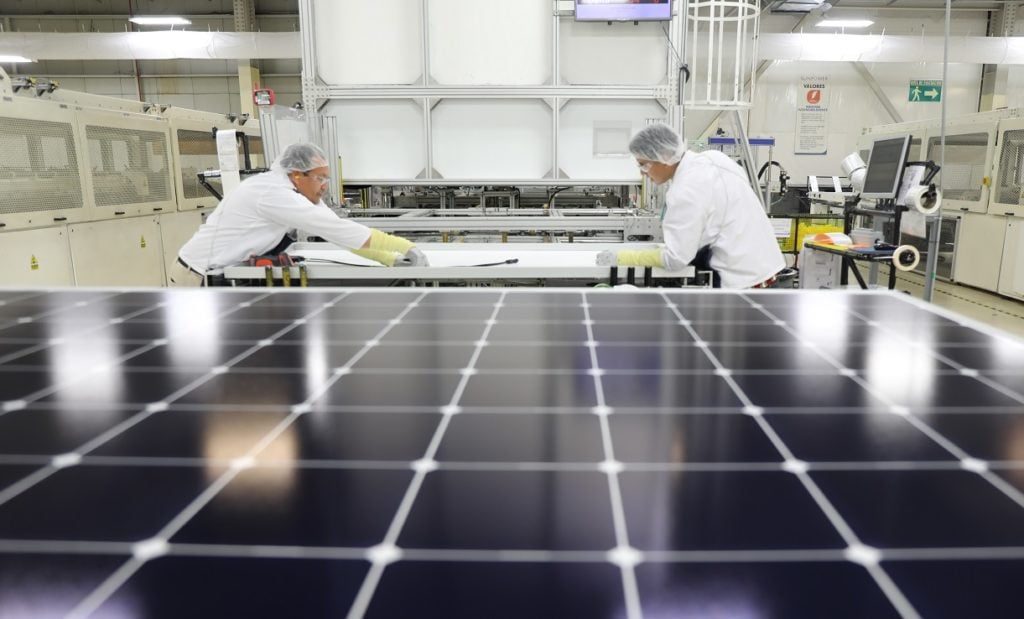
Maxeon Solar Technologies saw its opening quarter loss widen by 22% year-on-year as materials and logistics costs continue to be a thorn in the side of solar manufacturers.
But the company, spun out from SunPower last year, said it expects the addition of new product lines, higher average selling prices (ASPs) and a more optimised manufacturing structure to bolster both its top and bottom lines from the second half of 2020 onwards.
Unlock unlimited access for 12 whole months of distinctive global analysis
Photovoltaics International is now included.
- Regular insight and analysis of the industry’s biggest developments
- In-depth interviews with the industry’s leading figures
- Unlimited digital access to the PV Tech Power journal catalogue
- Unlimited digital access to the Photovoltaics International journal catalogue
- Access to more than 1,000 technical papers
- Discounts on Solar Media’s portfolio of events, in-person and virtual
Or continue reading this article for free
Last week Maxeon reported shipments and revenue figures within its forecasted range, totalling 379MW and US$165.4 million respectively. Both figures had contracted from those reported in Q4 2020 and Q1 2020 and contributed towards net loss of US$38.8 million for the reporting period, an increase of more than 22% on the US$31.7 million recorded in the corresponding period last year.
Jeff Waters, chief executive at Maxeon, said the wider net loss was attributable to reduced profit from operations and higher opex costs, with higher materials and logistics costs highlighted as being particular drags on the company’s bottom line.
Of particular impact on Maxeon’s financial performance is an out-of-market polysilicon contract, which the company described as being an “ongoing drag to profitability”, costing the firm more than US$80 million per year. While Maxeon sells on some of the material it does not use in its internal production, it does so at a loss because the contract is locked in “way above market prices”, Waters told analysts last Thursday. The contract is to run until December 2022.
While Maxeon was also able to realise higher average selling prices for its products in the reporting period, this was mainly reflective of the manufacturer passing on higher supply chain costs.
Maxeon increased its module prices throughout the opening quarter and CFO Kai Strohbecke noted that the price for its IBC line of panels had risen from US$0.49c per watt to US$0.53c/W, while its Performance series revenue per watt had increased to US$0.28c against US$0.25c reported in Q4 2020.
Overall ASPs reported by Maxeon were up 16% sequentially, driven both by price increases and the company’s more expensive IBC panels recording a higher share of total sales. Maxeon’s products aimed at distributed generation markets recorded a higher share, with large-scale solar module sales contributing just 16% of quarterly revenues.
Waters said that customers were gradually accepting higher prices because of the sustained cost pressures on supply chains, and as a result the company expects to begin converting its pipeline into bookings throughout H2 and resume large-scale sales early next year.
Maxeon has forecasted shipments of 415 – 475MW, revenues of US$165 – 185 million and a loss of US$5 – 15 million to be recorded in Q2 2021.
A further US$50 – 60 million is expected to be spent in the current quarter to upgrade its manufacturing facility in Malaysia to produce Maxeon’s 5 and 6 Series products from the Maxeon 2 Series it currently produces. That figure also includes R&D expenditure for Maxeon’s forthcoming 7 Series product.
The manufacturer is also backing its newly-announced Maxeon Air product to make significant strides in Europe. Announced last week, Maxeon Air is a lightweight, frameless solar panel designed for use in residential and commercial and industrial (C&I) applications that may otherwise have been restricted by low load roofs.
Waters said the product would be almost unique upon launch and, as a result, Maxeon would be able to realise higher ASPs and profit margins compared to its other product lines. Maxeon is to start production of the Air line in France, having identified Europe as a particularly strong market for the series initially, however Maxeon stressed the line’s ability to be manufactured at any of its facilities relatively flexibly, with the product borrowing much of the company’s current module assembly processes. Maxeon’s manufacturing footprint in Europe is set to diminish somewhat however through the closure of its facility in Toulouse, which is to cost the company between US$5 – 6 million in restructuring costs in the current quarter.
Waters added that he anticipated the potential market for the Maxeon Air line to be 4GW in Europe alone, describing the market as “underserved” by modules on the market today.
Transcript from Seeking Alpha.
